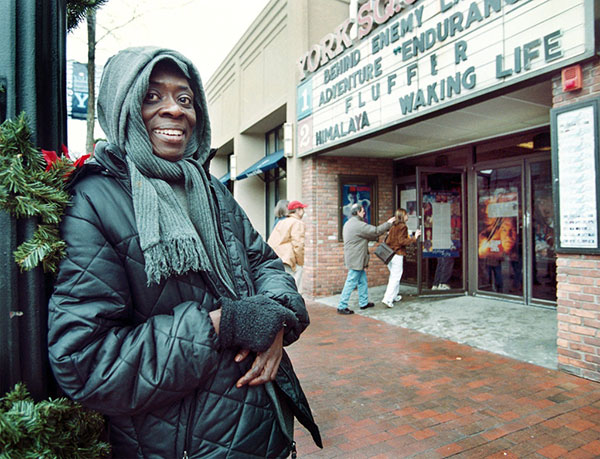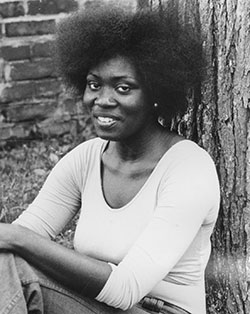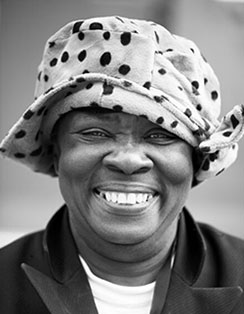Class News
Chris Getman ’64 remembers “The Shakespeare Lady”
March 26, 2021
When Margaret Holloway’s obituary appeared last year, Chris Getman wrote: “Did everyone see the picture and story in the New York Times about Margaret Holloway? ‘The Shakespeare Lady,’ as she was known, was a presence on the streets of downtown New Haven. She was a real character, a graduate of the Drama School, who was a victim of COVID-19 after she had turned her life around. Many of us knew her and interacted with her. She was a very accomplished person who had an unfortunate life.”
The New York Times article is reproduced below. The Yale Alumni Magazine also wrote an article about her.
Margaret Holloway, the ‘Shakespeare Lady’ of New Haven, Dies at 68
The New York Times
June 11, 2020
A once-promising director and actor who struggled with mental illness and drug addiction, she performed for years on the city’s streets. She died of Covid-19.

On the streets of New Haven, Conn., Margaret Holloway was known as the “Shakespeare Lady,” a tall, striking woman in ragged clothing who recited dramatic monologues for spare change.
Her stage, often, was outside Willoughby’s coffee shop, a hangout for Yale students and professionals. Her repertoire included “The Tempest,” “Macbeth” and the Greek alphabet, which she acted out letter by letter.
Many regarded Ms. Holloway as an eccentric local fixture; in the view of some business owners, however, she was an aggressive panhandler and public nuisance. But for those who knew her personal history, her life had tragic dimensions not unlike the material she performed.

Ms. Holloway was a 1980 graduate of the Yale School of Drama and a once-promising director, playwright, and actor. In the early 1970s she was a drama major at Bennington College in Vermont.
“She was star of the theater department,” Laura Spector, a college friend, said in an interview. “She was so talented, so powerful, so magnetic.”
Ms. Holloway’s career was cut short by mental illness and drug addiction soon after she left Yale. But she never stopped seeking understanding, human connection, and, above all, artistic expression.
“She loved people — she had relationships with everyone all over New Haven,” said Joan Channick, a Yale drama school professor who struck up a friendship with Ms. Holloway in the 1990s. “She called herself a great thespian. She had a lot of confidence in herself.”
Ms. Holloway died at 68 on May 30 at Yale New Haven Hospital. Gloria Astarita, her court-appointed conservator, said the cause was the novel coronavirus.

In “God Didn’t Give Me a Week’s Notice,” a short documentary about Ms. Holloway released in 2001, Ms. Holloway said she began experiencing signs of mental illness about 1983. She described her mental landscape this way: “I’m being raped. I’m being raped 24 hours a day, seven days a week.”
Living in a dingy rooming house or on the streets, Ms. Holloway performed in the shadow of Yale’s campus, clinging, in a way, to a time in her life when she was healthy, successful, and full of promise. Through it all her aspirations remained high-minded.
“She would want to have a disquisition about directing some Shakespeare play,” Ms. Channick said. “Having those conversations with someone who was living on the streets, it was jarring. Here’s this person so connected to people, well-educated, with a love of art and theater, whose life was destroyed by mental illness.”
Margaret Ann Holloway was born on Sept. 7, 1951, in Albany, Ga., to the Rev. Walter Holloway, a minister, and Bertha (Prince) Holloway, a homemaker. Ms. Holloway became estranged from her family as an adult.
Through a nonprofit group that provides scholarships to gifted minority students, Ms. Holloway attended Northfield Mount Hermon, a prep school in Massachusetts. She attended Carleton College in Minnesota for a year before transferring to Bennington, where she came into her own as a drama student.
Ms. Spector said she vividly remembered the one-woman autobiographical play that Ms. Holloway wrote, directed, and starred in for her senior thesis, a work that dealt with her upbringing as a young black woman in the rural South. “She brought down the house,” Ms. Spector said.
After decades out of touch, Ms. Spector reconnected with Ms. Holloway in 2005 after reading a newspaper article about her. She found the same lively, gregarious, emotionally intelligent person she had known. “I knocked on the door and from the top of the stairs she called out, ‘Laura, how the hell are you?’” Ms. Spector said. “She didn’t miss a beat.”
Ms. Holloway, who stopped performing in the street about three years ago because of failing health, found a measure of stability and calm in recent times. Residing in a nursing home in New Haven, she had clean clothes, regular meals, a shower, and monthly visits from Ms. Channick and other friends, who brought her money and the small luxuries she asked for, like lipstick.
“We would talk about what was going on in the world,” Ms. Channick said. “But mostly, we would talk about theater.”

